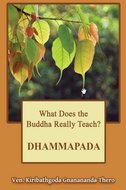 The Sutta: I have heard that at one time the Blessed One was staying at Nadika, in the Brick Hall. There he addressed the monks, "Monks, mindfulness of death — when developed & pursued — is of great fruit & great benefit. It gains a footing in the Deathless, has the Deathless as its final end. And how is mindfulness of death developed & pursued so that it is of great fruit & great benefit, gains a footing in the Deathless, and has the Deathless as its final end? "There is the case where a monk, as day departs and night returns, reflects: 'Many are the [possible] causes of my death. A snake might bite me, a scorpion might sting me, a centipede might bite me. That would be how my death would come about. That would be an obstruction for me. Stumbling, I might fall; my food, digested, might trouble me; my bile might be provoked, my phlegm... piercing wind forces [in the body] might be provoked. That would be how my death would come about. That would be an obstruction for me.' Then the monk should investigate: 'Are there any evil, unskillful mental qualities unabandoned by me that would be an obstruction for me were I to die in the night?' If, on reflecting, he realizes that there are evil, unskillful mental qualities unabandoned by him that would be an obstruction for him were he to die in the night, then he should put forth extra desire, effort, diligence, endeavor, undivided mindfulness, & alertness for the abandoning of those very same evil, unskillful qualities. Just as when a person whose turban or head was on fire would put forth extra desire, effort, diligence, endeavor, undivided mindfulness, & alertness to put out the fire on his turban or head, in the same way the monk should put forth extra desire, effort, diligence, endeavor, undivided mindfulness, & alertness for the abandoning of those very same evil, unskillful qualities. But if, on reflecting, he realizes that there are no evil, unskillful mental qualities unabandoned by him that would be an obstruction for him were he to die in the night, then for that very reason he should dwell in joy & rapture, training himself day & night in skillful qualities. "Further, there is the case where a monk, as night departs and day returns, reflects: 'Many are the [possible] causes of my death. A snake might bite me, a scorpion might sting me, a centipede might bite me. That would be how my death would come about. That would be an obstruction for me. Stumbling, I might fall; my food, digested, might trouble me; my bile might be provoked, my phlegm... piercing wind forces [in the body] might be provoked. That would be how my death would come about. That would be an obstruction for me.' Then the monk should investigate: 'Are there any evil, unskillful mental qualities unabandoned by me that would be an obstruction for me were I to die during the day?' If, on reflecting, he realizes that there are evil, unskillful mental qualities unabandoned by him that would be an obstruction for him were he to die during the day, then he should put forth extra desire, effort, diligence, endeavor, undivided mindfulness, & alertness for the abandoning of those very same evil, unskillful qualities. Just as when a person whose turban or head was on fire would put forth extra desire, effort, diligence, endeavor, undivided mindfulness, & alertness to put out the fire on his turban or head, in the same way the monk should put forth extra desire, effort, diligence, endeavor, undivided mindfulness, & alertness for the abandoning of those very same evil, unskillful qualities. But if, on reflecting, he realizes that there are no evil, unskillful mental qualities unabandoned by him that would be an obstruction for him were he to die during the day, then for that very reason he should dwell in joy & rapture, training himself day & night in skillful qualities. "This, monks, is how mindfulness of death is developed & pursued so that it is of great fruit & great benefit, gains a footing in the Deathless, and has the Deathless as its final end." That is what the Blessed One said. Gratified, the monks delighted in the Blessed One's words. ©1997 Thanissaro Bhikkhu. The text of this page ("Maranassati Sutta: Mindfulness of Death (2)", by Thanissaro Bhikkhu) is licensed under a Creative Commons Attribution-NonCommercial 4.0 International License. To view a copy of the license, visit http://creativecommons.org/licenses/by-nc/4.0/. Documents linked from this page may be subject to other restrictions. Transcribed from a file provided by the translator. Last revised for Access to Insight on 30 November 2013.  76. When the wise person sees your faults, he points them out and helps you to improve. It is as if he guides you to a hidden treasure. Associate with such a wise person. As a result, only good will come, not bad. 77. A noble friend advises you, instructs you, and restrains you from doing evil. Such a noble friend is pleasing to grateful people but displeasing to the ungrateful. 78. Do not associate with evil friends. Do not associate with people with evil intentions. Associate with noble friends. Associate with the best of people who are full of wholesome qualities. 79. The wise person tranquilizes his mind through the realization of Dhamma. He lives happily rejoicing in the Dhamma. He always delights in the true Dhamma taught by the noble ones. 80. Irrigators guide water to wherever it is needed. Arrow makers shape arrows to fit to task. Carpenters fashion wood for the desired design. The wise tame themselves in the same way. 81. As a solid mass of rock is not shaken by a storm, so too the wise are not moved by praise or blame. 82. As a deep lake that is clear and still, so too are the wise, having listened to the true Dhamma. 83. Noble people let go of desire for everything. They do not speak deceptively in order to gain pleasures and desires. Touched by happiness or unhappiness, the wise show no elation or depression. 84. The wise person neither commits evil for his own sake nor for the sake of others. He neither desires children, nor wealth, nor kingdom unfaithfully. He does not desire any success by unrighteous means. He is indeed virtuous, wise, and righteous. 85. Few, among humans, cross over the journey of rebirth to the farther shore called Nibbāna. The rest, the majority of people, only run about on this shore. 86. Those who act according to the perfectly taught Dhamma will reach Nibbāna, by crossing the realm of Māra, which is difficult to cross. 87. The wise person abandons unwholesome things and cultivates wholesome things. Then, abandoning household life, that person becomes a monk or a nun and enters the solitude, which is hardly enjoyed by ordinary people. 88. The wise person seeks delight in solitude, abandoning sense pleasures. Heading towards ultimate purification, he cleanses himself of the things that defile the mind. 89. Liberated ones’ minds have reached full maturity in the enlightenment factors. Giving up all grasping, they delight in Nibbāna. Since they have destroyed impurities, they glow with wisdom. They are the ones who attain ultimate freedom in this world. |

|
LocationMahamevnawa Buddhist Monastery Winnipeg at the Buddha Meditation Center Winnipeg 2610 St Mary’s Road, Winnipeg, MB R2N 4A2 204 869 5272 [email protected] We sometimes take photos of our events and post them on our website. If you would like us to take down any images you appear in across any of our platforms, please let us know and we will be happy to remove them. |
Learning
Quick Links
Our Branches
We gratefully recognize that our monastery rests on the traditional territory of Anishinaabeg, Cree, Oji-Cree, Dakota, and Dene peoples, and the homeland of the Métis Nation.
|

 RSS Feed
RSS Feed

